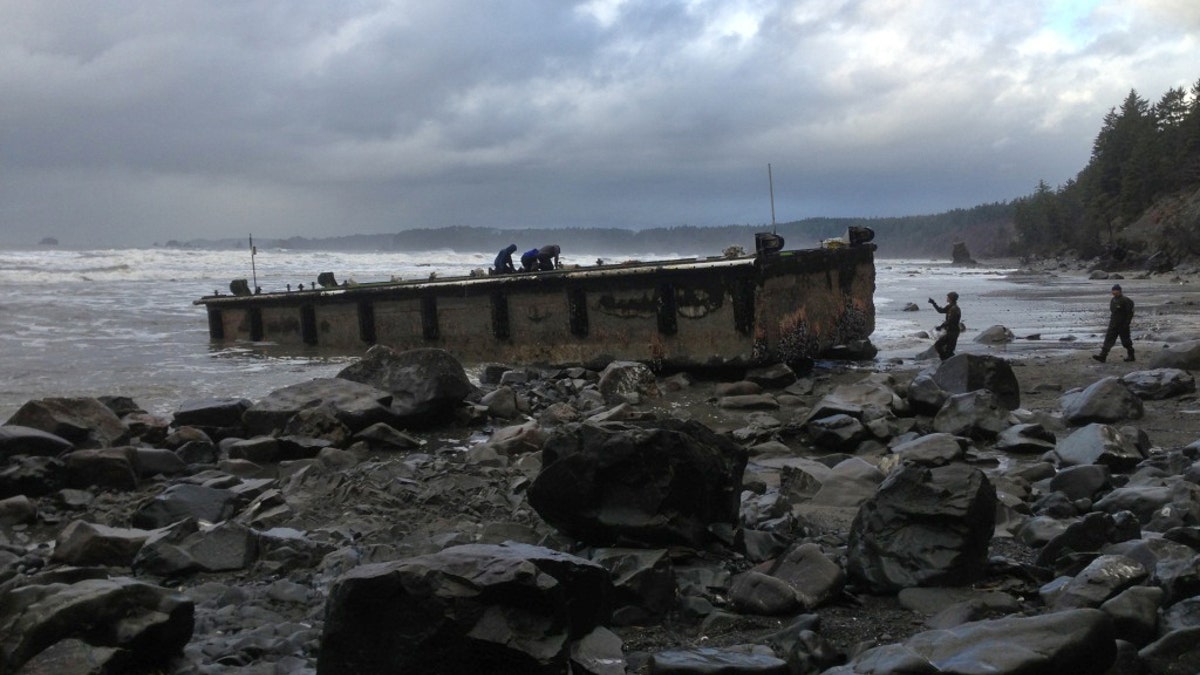
In this Dec. 21, 2012 file photo provided by the Washington Dept. of Fish & Wildlife, scientists inspect a dock that floated up on a remote stretch of wilderness beach in northwestern Washington. A scientist who examined the dock says it looks just like the one that came ashore on a central Oregon beach last summer, suggesting it also is a piece of tsunami debris from Japan. (AP Photo/Washington Dept. of Fish & Wildlife) (The Associated Press)
A scientist who examined the dock that recently washed ashore on Washington's Olympic Peninsula says it looks just like the one that came ashore on a central Oregon beach last summer, suggesting it also is a piece of tsunami debris from Japan.
John Chapman, an assistant professor of fisheries at Oregon State University's Hatfield Marine Science Center, said Friday the Washington dock found earlier this month has the same dimensions and configuration as the one found near Newport, Ore. The Oregon dock broke loose from a Japanese fishing port in 2011.
"It was identical so far as we could tell," said Chapman, who was one of the eight people who hiked through old growth forest and crossed a rain-swollen creek on Dec. 21 to examine the dock. "It has the same set of cleats. It has the same rollers, the same shape, dimensions, the same bumper configuration."
But there was no commemorative plaque on the dock found in Washington, like the one in Oregon had, to identify where it came from, he said. A stainless steel plaque identified it as one of four owned by Aomori Prefecture that broke loose form the port of Misawa during the March 2011 tsunami.
Efforts to trace and confirm the origin of the Washington dock have not yet been successful. The Coast Guard spotted it Dec. 18 on a remote stretch of wilderness beach on the northwestern tip of Washington protected by the Olympic National Park.
The Washington Ecology Department said nearly 30 species found on the dock have been identified, and none of them poses a high risk of becoming invasive.
Chapman said just the lower number of species and individual organisms on the Washington dock make it a far lower risk than the Oregon dock.
Also, the crashing surf on the Washington shore is not a hospitable habitat for species native to placid pot waters in Japan, experts say.
So far, there has been no sign any of the Japanese species on the Oregon dock has established in Oregon, Chapman said. However, there is no formal monitoring going on.
The Oregon dock measured 66 feet long, 19 feet wide and 7 feet high and weighed 165 tons before it was cut up and hauled away. Volunteers scraped off 2 tons of seaweed and creatures clinging to it and ran blowtorches over the surface to sterilize it.
Chapman said a flooded stream stopped them from their first attempt at reaching the Washington dock. But they returned the next day, wearing dry suits provided by the National Park Service, and were helped across by a search and rescue team. They used a rope to descend to the beach. The dry suits proved helpful on the beach, where they were dodging 16-foot waves.
"The dock was being pulverized on the rocks there," Chapman said. Styrofoam was coming out where the concrete had fractured.









































